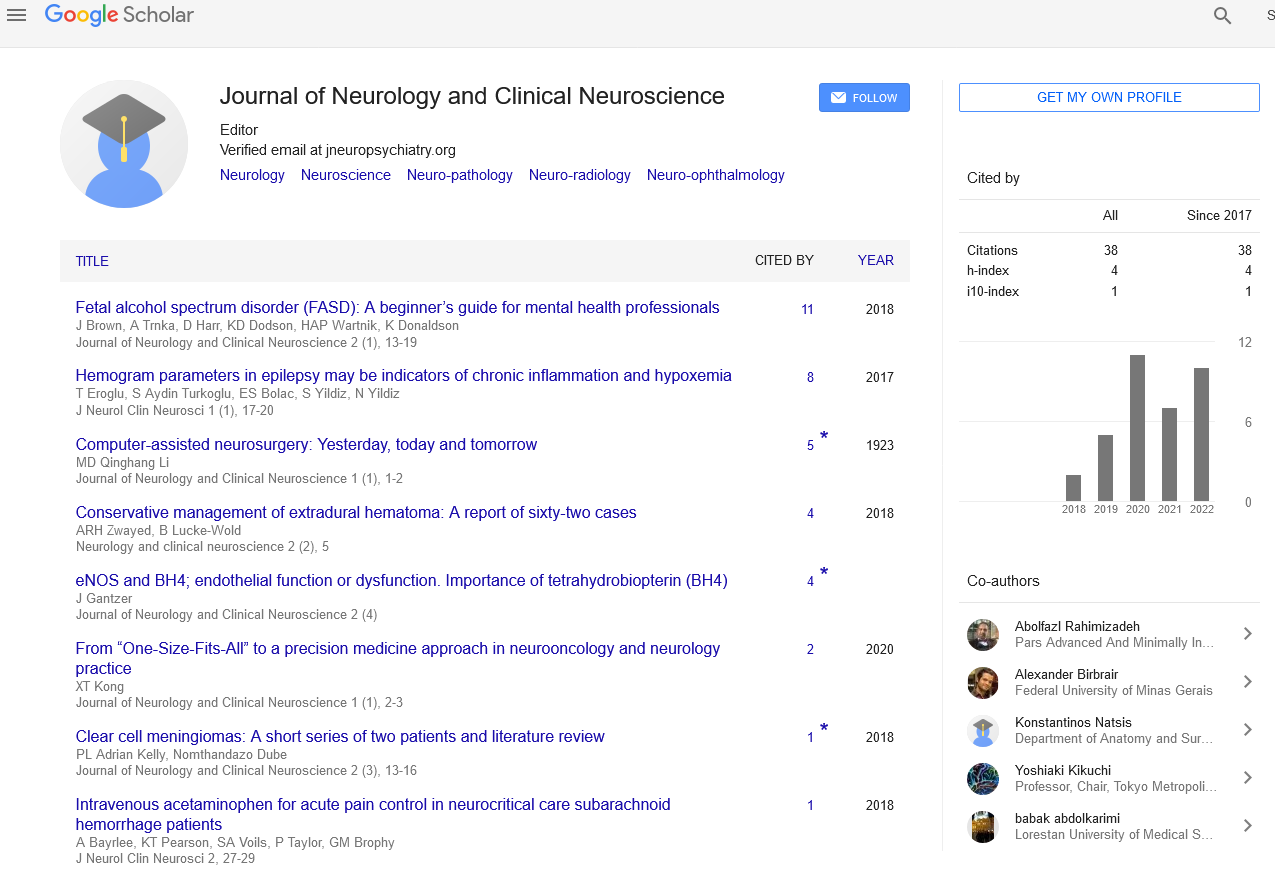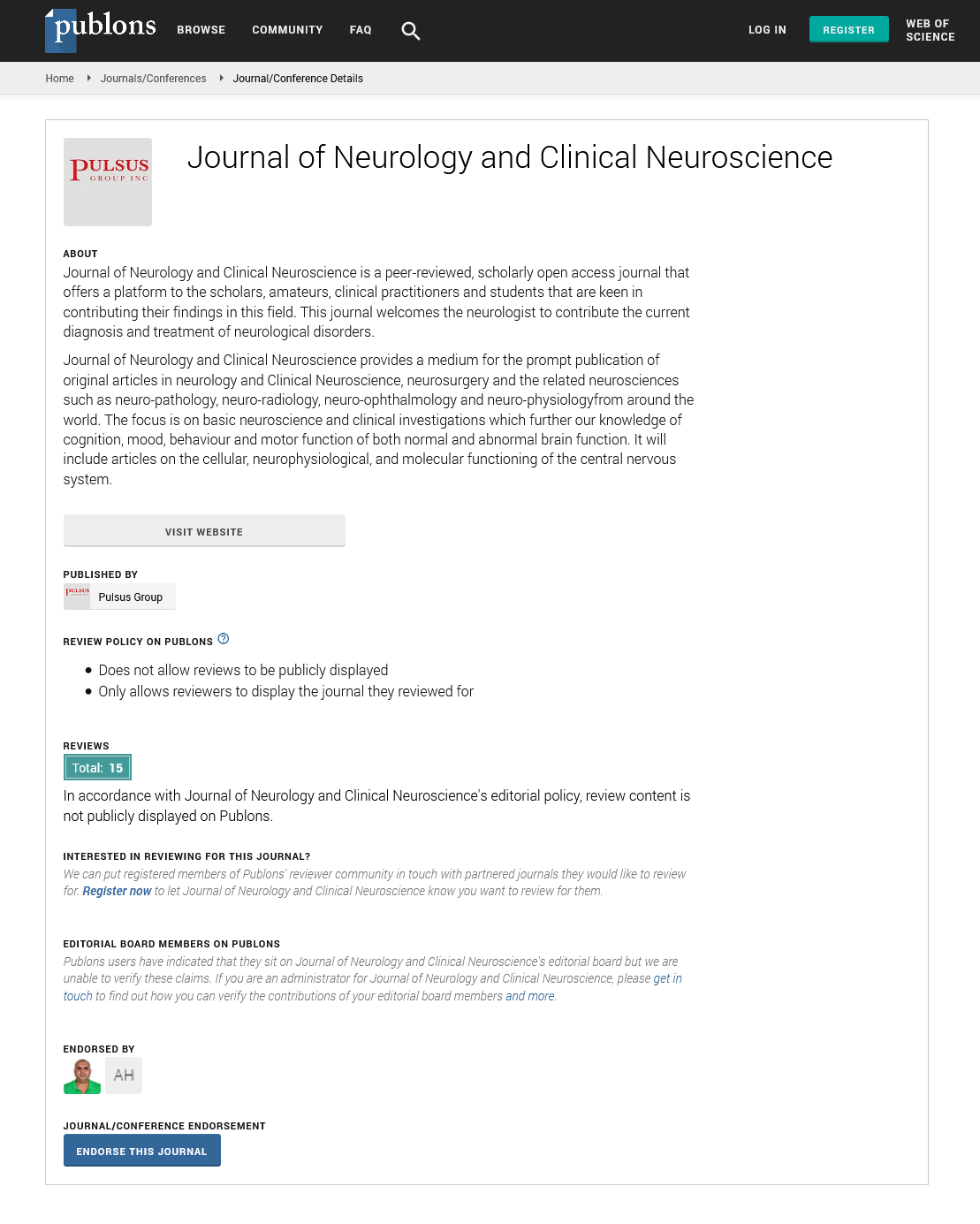Parkinson’s disease and oral health status: an approach to the public health aspect
Received: 02-Feb-2018 Accepted Date: Feb 06, 2018; Published: 09-Feb-2018
Citation: Palone MRT. Parkinson’s disease and oral health status: an approach to the public health aspect. J Neurol Clin Neurosci. 2018;2(1):30.
This open-access article is distributed under the terms of the Creative Commons Attribution Non-Commercial License (CC BY-NC) (http://creativecommons.org/licenses/by-nc/4.0/), which permits reuse, distribution and reproduction of the article, provided that the original work is properly cited and the reuse is restricted to noncommercial purposes. For commercial reuse, contact reprints@pulsus.com
Editorial
Parkinson’s disease (PD) is a serious neurodegenerative disorder that is estimated to affect thousands of people worldwide [1]. Its main features are the presence of intracellular α-synuclein-positive inclusions, known as Lewy bodies and Lewy neuritis, and the nigrostriatal cell loss [2].
It is worth highlighting that the PD prevalence increases steadily with age. Regarding to the prevalence by sex, a higher prevalence has been reported in males. Moreover, interestingly, individuals from North America, Europe and Australia appear to be more susceptible to this disease than individuals from Asia [1].
PD patients, in turn, present several motor and non-motor symptoms. Hyposmia, sleep disorders, depression and constipation are examples of some of the non-motor symptoms [2,3]. Among the motor symptoms are the rigidity, rest tremor, bradykinesia, and postural and gait impairment [2]. Thus, tasks that may be simple, such as the oral hygiene care, often they become quite hard.
Recent researches have shown that PD patients have more serious problems in oral health status than the general population [4,5]. Some of these disorders include increased prevalence of caries and periodontal disease, sialorrhea and drooling, xerostomia, orofacial pain, mastication disorders, bruxism and taste impairment [5].
Considering that oral health problems and several systemic diseases are closely interlinked [6], a change of habits as well as the reinforcement of oral health care are indispensable for PD patients [4,5]. For this, the role of caregivers and dentists is essential [7]. In case this does not occur, other health problems may arise, which makes it more difficult to achieve any success in PD treatment.
It must also be borne in mind that PD patients require specialized services with multidisciplinary teams. Medicine, psychology, speech therapy, physiotherapy and nursing are examples of disciplines involved in PD treatment [7].
Consequently, it is clear that the dentists should also be included in these teams. This is undoubtedly very important for the integral healthcare of these patients.
Another point that should be mentioned concerns the organization of health systems in the various countries of the world. In this sense, the institutions should provide health services with different levels of complexity. In addition, they need to be integrated in order to ensure the integral care for all PD cases.
In Brazil, for example, the health public system (Unified Health System) has as one of its principles the integrality of assistance [8]. Therefore, with a view to enhancing treatment outcomes for PD patients, such legislation can serve as a model for other countries.
In conclusion, the implementation of effective policies and programs aimed at the integral treatment of PD patients is of extreme importance. Furthermore, new researches in this area may contribute to improvements in health promotion through development of interventions that take into account socials and cultural influences on the health of these patients.
REFERENCES
- Pringsheim T, Jette N, Frolkis A, et al. The prevalence of Parkinson's disease: a systematic review and meta-analysis. Mov Disord. 2014;29:1583-90.
- Massano J, Bhatia KP. Clinical approach to Parkinson's disease: features, diagnosis, and principles of management. Cold Spring Harb Perspect Med. 2012;2:008870.
- Schapira AHV, Chaudhuri KR, Jenner P. Non-motor features of Parkinson disease. Nat Rev Neurosci. 2017;18:435-50.
- Pradeep AR, Singh SP, Martande SS, et al. Clinical evaluation of the periodontal health condition and oral health awareness in Parkinson's disease patients. Gerodontology. 2015;32:100-6.
- Zlotnik Y, Balash Y, Korczyn AD, et al. Disorders of the oral cavity in Parkinson's disease and parkinsonian syndromes. Parkinsons Dis. 2015;2015:379-482.
- Jin LJ, Lamster IB, Greenspan JS, et al. Global burden of oral diseases: emerging concepts, management and interplay with systemic health. Oral Dis. 2016;22:609-19.
- Qamar MA, Harington G, Trump S, et al. Multidisciplinary care in Parkinson's disease. Int Rev Neurobiol. 2017;132:511-23.
- Sanches TT, Siqueira OT, Papp MC, et al. Evolução do sistema público de saúde no Brasil frente ao estágio atual da prevenção do câncer de colo uterino em mulheres jovens e adolescentes. Rev Fac Med. 2017;65:115-20.





